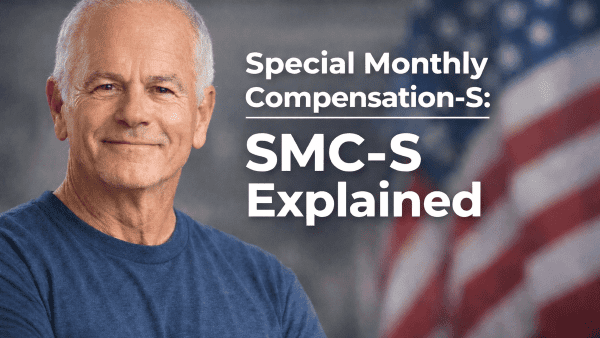Looking for Expert-Level VA Claim Answers?📱Call Us Now! 737-295-2226
If you’re a veteran suffering from severe Post-Traumatic Stress Disorder (PTSD) and struggling with daily activities, you may be eligible for Special Monthly Compensation (SMC) at the R1 level.
This additional benefit is specifically designed for veterans who require regular aid and attendance due to their service-connected disabilities.
In this article, we’ll guide you through the process of qualifying for SMC R1 for PTSD, including eligibility criteria, application steps, and important considerations.
Let’s begin!
Table of Contents
Summary of Key Points
- Eligibility for SMC R1: Veterans suffering from severe PTSD that requires regular aid and attendance may qualify for Special Monthly Compensation (SMC) R1, even if they are not completely unable to care for themselves. To receive compensation under SMC R1 or R2/T for aid and attendance, you must first qualify under SMC level O or level N ½ and K together.
- Distinction Between SMC R1 and R2/T: SMC R1 involves regular aid from non-professional caregivers like family or friends, while SMC R2/T requires specialized medical care provided by licensed professionals, with higher compensation rates for R2/T. Pay rates for VA SMC aid and attendance regularly exceed $10,000 per month.
- Application Process: The VA should automatically add SMC R if the veteran qualifies based on their disability and need for aid and attendance. However, if the VA doesn’t add SMC benefits automatically, veterans can apply for SMC R1 by submitting comprehensive medical evidence, filing a claim through the VA’s online portal or with the assistance of a VA-accredited representative, and potentially undergoing a Compensation and Pension (C&P) exam.
What is SMC R1?
Special Monthly Compensation (SMC) is a tax-free benefit that provides additional financial support to veterans with severe disabilities.
The SMC R1 rate is granted to veterans who need regular aid and attendance because their disabilities are so severe that they cannot manage daily activities independently.
This includes assistance with tasks like bathing, dressing, eating, and maintaining personal safety.
SMC R1 vs SMC R2/T
SMC under Category R is designed for veterans who require Aid and Attendance (A&A) due to severe service-connected disabilities.
This category is specifically for veterans who need daily assistance with activities such as dressing, cleaning, grooming, and prosthetic adjustments.
- Level R1: This level is assigned when the necessary aid and attendance can be provided by a non-professional, such as a family member or friend. It recognizes that the veteran requires daily assistance but does not need the specialized care of a medical professional.
- Level R2: This level is granted when the required aid and attendance must be provided by a licensed medical professional or someone working under the supervision of a licensed medical professional. To qualify for R2, the VA must determine that the veteran would otherwise need to be hospitalized or placed in a nursing home if they did not have professional care available at home. The “T” in SMC R2/T stands for “Tiered,” indicating a tiered payment structure based on the severity and extent of required care.
The key distinction between SMC R1 and SMC R2/T lies in the level of care required:
- SMC R1: Requires regular aid and attendance for daily activities from family or friends. The max rate of pay for SMC R1 can exceed $10,000 per month.
- SMC R2/T: Requires an even higher level of skilled medical care or nursing, often provided by a professional or specialized caregiver. The max rate of pay for SMC R2/T can exceed $11,000 per month.
Note: VA aid and attendance pay rates under SMC R1 or R2/T are paid in lieu of VA disability compensation pay (you don’t get both).
VA SMC Level R (Aid and Attendance) Overview
Eligibility Criteria:
To receive compensation under SMC Level R, the veteran must qualify under one of the following:
- SMC Level O or a combination of Levels N 1/2 and K.
- The veteran must require assistance with daily living activities such as dressing, bathing, grooming, eating, using the restroom, and adjusting prosthetic or orthopedic devices frequently.
Additional Criteria:
A veteran can also qualify if:
- Their physical or mental disability requires another person to regularly care for them to prevent self-harm or harm to others, whether intentional or accidental.
- They are bedridden, meaning their condition is severe enough to confine them to bed continuously. Simply choosing to stay in bed or being prescribed bed rest by a physician does not qualify. The veteran must also need regular aid and attendance from another person.
Compensation Limits:
- The combined compensation rate of Level K and Level R cannot exceed the highest amount given for Level R1.
- The condition that qualifies for Level K cannot be the same as the condition that qualifies for Level R.
What are the VA SMC R1 Requirements?
To qualify for SMC R1, a veteran with PTSD must meet the following three criteria:
1. 100% Total Disability Rating:
A single disability evaluated as 100% disabling under a schedular evaluation is generally a prerequisite for entitlement to aid and attendance benefits.
The veteran must have a 100% disability rating, either from PTSD alone or in combination with other service-connected disabilities.
Alternatively, the veteran may qualify under the VA’s “Total Disability based on Individual Unemployability” (TDIU), which compensates at the 100% rate even if the total combined rating is less than 100%.
2. Need for Regular Aid and Attendance:
The PTSD symptoms must be so severe that they require regular aid and attendance.
This means the veteran needs help from another person to perform personal functions required in everyday living.
To qualify for VA SMC R1, the veteran’s disabilities must be severe enough to require regular aid and attendance, but this does not mean the veteran must be entirely dependent or bedridden.
3. Qualify for SMC-O, OR qualify for SMC-N 1/2 AND SMC-K
To receive compensation under SMC R1 or R2/T (Aid and Attendance), you must first qualify under level O or levels N ½ and K together.
The veteran must provide medical evidence demonstrating a significant loss of bodily functions, such as loss of hearing, loss of vision, amputations, or complete paralysis.
Do I Have to Be Completely Unable to Care for Myself to Get SMC R1 or R2/T?
No, a veteran does not need to be completely unable to care for themselves to qualify for Special Monthly Compensation (SMC) at the R1 or R2/T levels.
The key criteria focus on the requirement for regular aid and attendance or a higher level of specialized care due to service-connected disabilities.
For both SMC R1 and R2/T, the veteran’s disabilities must be severe enough to necessitate regular aid and attendance, but this does not mean the veteran must be entirely dependent or bedridden.
The primary determining factor is the level of care needed to assist with daily living activities and ensure the veteran’s safety, rather than a total inability to care for oneself.
This assistance can range from help with bathing, dressing, and eating to more specialized medical care, such as managing IVs, catheters, or other complex medical needs.
How to Apply for SMC R1 for PTSD
Generally, the VA automatically assigns the appropriate level of Special Monthly Compensation (SMC) if a veteran qualifies based on their disability and needs.
However, there are instances where this might not happen.
In such cases, veterans can apply for SMC R1 by submitting a claim to ensure they receive the benefits they are entitled to.
Step #1. Gather Medical Evidence:
Collect comprehensive medical records detailing your diagnosis, the severity of your PTSD, and how it impacts your ability to perform daily activities.
This includes statements from healthcare providers describing your need for aid and attendance.
Step #2. Submit a VA Claim:
You can submit your claim for SMC R1 through the VA’s online portal or by working with a VA-accredited representative.
When submitting your claim, it’s critical to clearly state that the claim is specifically for SMC benefits due to the need for aid and attendance.
Be sure to include all relevant medical evidence and additional documentation that supports your claim.
For example, clearly indicate the condition, such as “Request for SMC R1 for PTSD,” and detail how the PTSD symptoms necessitate regular aid and attendance.
Note: This can apply to a wide range of service-connected disabilities, including but not limited to PTSD, physical injuries, or other severe medical conditions.
Step #3. Compensation and Pension (C&P) Exam:
The VA will likely require you to undergo a C&P exam to assess the extent of your disabilities and your need for aid and attendance.
This exam is a crucial part of the evaluation process.
Step #4. Decision and Follow Up:
The VA will ultimately make a decision to approve, deny, or defer your claim for Special Monthly Compensation (SMC) and Aid & Attendance under SMC R1 or R2/T.
This decision is based on the review of the evidence provided, including medical records and documentation of your need for additional care.
If approved, you will receive additional compensation corresponding to the level of care required.
If denied, you may appeal the decision or provide further evidence to support your claim.
About the Author

Brian Reese
Brian Reese is a world-renowned VA disability benefits expert and the #1 bestselling author of VA Claim Secrets and You Deserve It. Motivated by his own frustration with the VA claim process, Brian founded VA Claims Insider to help disabled veterans secure their VA disability compensation faster, regardless of their past struggles with the VA. Since 2013, he has positively impacted the lives of over 10 million military, veterans, and their families.
A former active-duty Air Force officer, Brian has extensive experience leading diverse teams in challenging international environments, including a combat tour in Afghanistan in 2011 supporting Operation ENDURING FREEDOM.
Brian is a Distinguished Graduate of Management from the United States Air Force Academy and earned his MBA from Oklahoma State University’s Spears School of Business, where he was a National Honor Scholar, ranking in the top 1% of his class.



